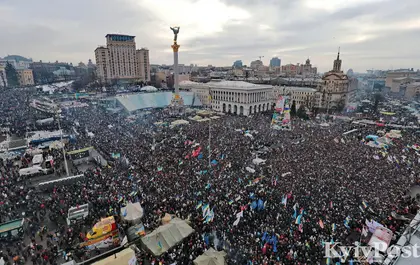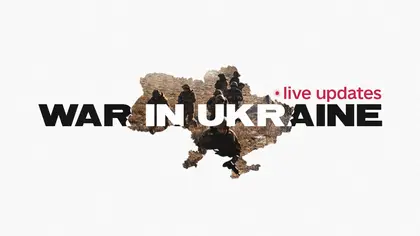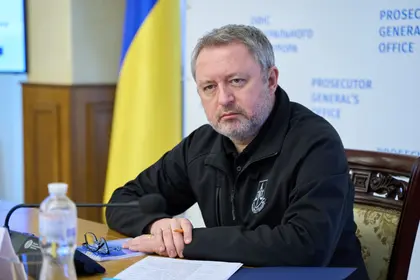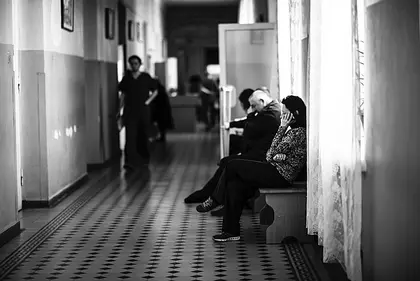After more than three years of President Viktor Yanukovych’s march towards dictatorship, Ukrainians finally had enough. Yanukovych’s misrule included rampant corruption, persecution of his political enemies, police brutality, and sustained attempts at censorship and harassment of journalists. The business community also had numerous complaints and foreign investment remained tepid in light of the poor investment climate.
But the trigger for the massive protests was Yanukovych’s refusal in November to sign a political and trade association agreement with the European Union, cementing his turn away from the West and towards the Kremlin. Journalist Mustafa Nayyem’s Facebook post on Nov. 21 calling people to Independence Square provided the spark to ignite the uprising.
Political repression
At the start of 2013, two major political foes of Yanukovych remained in prison: former Prime Minister Yulia Tymoshenko and former top cop Yuriy Lutsenko. Both were recognized as political prisoners by the European Court of Human Rights.
However, they faced different fates. Lutsenko was pardoned by Yanukovych in April, a move largely perceived as the result of Western and domestic pressure.
Meanwhile, Tymoshenko faced new accusations of involvement in the 1996 assassination of lawmaker Yevhen Shcherban on the tarmac of Donetsk airport. The case was soon closed, but Tymoshenko remained jailed on a conviction of abuse of power for a 2009 natural gas agreement she reached with Russia. She was freed only after Yanukovych fled to Russia on Feb. 22, 2014.
Apart from high-profile political cases, there were also several trials involving non-public figures, which gained public resonance and added to the police state image Ukraine had acquired. Two Ukrainians were sentenced to outrageous prison terms for altering the graffiti image of a man resembling Yanukovych, painted on a wall. They had painted a red dot on his forehead.
While the victims of Yanukovych’s regime continued to face prison sentences, the judges who presided over the show trials were promoted for their loyalty to the authorities.
Pukach conviction
One of the most flagrant crimes in Ukrainian history was the Sept. 16, 2000 murder of journalist Georgiy Gongadze. The opposition journalist and founder of the Ukrayinska Pravda news site went missing. His corpse was found several months later, beheaded in a forest outside of Kyiv. The investigation of the crime stalled for years. Then, in January 2013, former police general Oleksiy Pukach was sentenced to life in prison for intentionally murdering Gongadze.
Former President Leonid Kuchma has been accused of ordering the journalist’s assassination. He denies this allegation. However, no one has ever been brought to justice for ordering Gongadze’s killing, and Pukach remains the highest-ranking official convicted in the case.
Media crisis
Ukrainian media has long been dominated by oligarchs who own unprofitable outlets and use them as political weapons to promote friends, punish foes and mislead the public. However, in 2013, the situation became even worse. Journalists faced censorship, while media outlets churned out entertaining content to distract from the real state of affairs in the country.
First, one of the top television channels, Inter, was sold to Dmytro Firtash, an oligarch tied to Yanukovych and his close associates, and Serhiy Lyovochkin, the president’s chief of staff. Under the new owners, Inter’s news coverage amounted to pro-Yanukovych publicity.
TVi, an opposition news channel known for critical reporting and strong investigations, got a new owner, the little-known New York-based Ukrainian Alexander Altman. Some of the channel’s staff went on strike and eventually quit, saying the real owner was a Yanukovych ally.
Two more influential print publications, Korrespondent and Forbes, were bought by Serhiy Kurchenko, who was close to the president’s elder son, Oleksandr Yanukovych, and seen as a front man of the family. Outraged by the new owner’s censorship, 13 journalists left Forbes. Days later, Vitaly Sych, the chief editor who had led Korrespondent for more than a decade, was removed from his post. Several more respected journalists followed Sych.
The authorities’ intervention into media was perceived as an effort to stifle criticism before the 2015 elections.
Meanwhile, the Kyiv Post made an important move toward financial independence in 2013 by establishing a paywall, a system common in the United States and Europe, in which paid subscribers get access to all content.
Business deterioration
Ukraine’s gross domestic product in 2013 was the highest recorded to date: $180 billion.
But the number masked serious problems. The country lagged in the World Bank’s Doing Business rating: 137th place out of 185 countries. Foreign currency reserves fell to their lowest level since the 2008 global crisis. The economy was largely in the shadows, corruption flourished and raider attacks against businesses were a regular occurrence.
One of the most sensational cases was a raid of Globus shopping mall, located in the very center of Kyiv. The takeover of the $200 million property from a British investor overnight in September, yet it triggered no reaction from police and was legitimized by a court ruling.
Change of vector
Yanukovych masked his pro-Kremlin policy with pro-European rhetoric. But his authoritarian governing style didn’t fit with EU values. Russia forced the issue by launching a trade war against Ukraine to pressure it into joining a Moscow-led customs unit of former Soviet republics — including Belarus and Kazakhstan — rather than the EU.
Yanukovych buckled under Putin’s pressure and reversed course. On Nov. 21, 2013, his then-Prime Minister Mykola Azarov announced that the country would put the association process on hold.
Euromaidan Revolution
Nayyem’s Facebook post helped channel the public outrage. Hundreds of protesters immediately turned out in the rain on Kyiv’s main Independence Square on Nov. 21. Largely attended by students, the peaceful protests aimed to encourage Yanukovych to change his mind ahead of an important Nov. 29 EU summit in Vilnius, Lithuania, where he was supposed to sign the agreement. The summit ended disastrously for Yanukovych as he once again spurned Europe.
And, on the night of Nov. 30, riot police brutally attacked the protesters and journalists. The footage of that attack shocked the country by confronting citizens with the nightmarish reality that police were willing to beat peaceful citizens in the streets.
Many more Ukrainians took to the streets including, on Sunday, Dec. 1, hundreds of thousands of Ukrainians.
The issue was no longer just about integration with the EU. Rather, it was about basic human rights.
2013 ended with great uncertainty as tent camps controlled Khreshchatyk Street and Independence Square.
You can also highlight the text and press Ctrl + Enter







Comments (0)